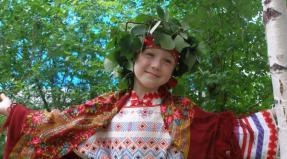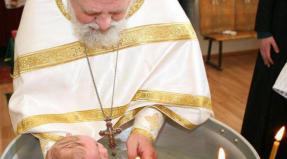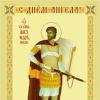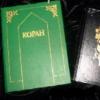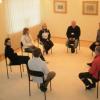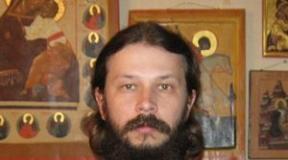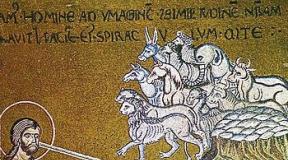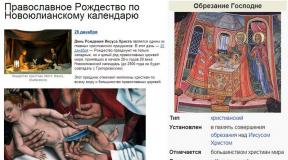The problem of man in Christianity. The doctrine of man in Christianity and neo-language
IN man's nature three components: body, soul and spirit.
Body - material nature. God created a man "From the dust of earthly", that is, from the matter from which the rest of the world has created. The name of the first person "Adam" comes from the Jewish word "Adam" - "Earth". A person does not differ from his bodily life from other living beings - animals and consists of meeting the needs of the body. The needs of the body are appropriate to the satisfaction of the two main instincts: 1) instinct of self-preservation and 2) instinct of continuation of the genus. To communicate with the outside world, the human body is endowed with five senses: vision, hearing, smelling, taste, tanging.
Soul Intangible start, vitalistic (life) force given by God, as a revitalizing principle in order to manage the body. After creating the body of a person from the dust of the earth, God "blown in his face his breath of life, and became a man with soul to an aim" (Gen. 2, 7). The properties and actions of the soul have three types: thoughts, feelings and desires. The body body, with the help of which the soul produces his mental work, is the brain. The central organ of feelings is the heart. The wishes of a man lead the will. Thus, the soul and body are closely connected with each other. The soul is created by God, one with the body and lives him. The soul continues to exist after the death of man. God creates every soul at the time of conception, according to Christian teaching.
Spirit - This is the special gift of God, who binds man with his Creator. It is a "breath of life" and there is a higher, divine start in man, that is, his spirit, through which it is radically different from all other living beings. Spirit in man manifests itself in three types: fear of God, conscience and thirst for God. The spirit is what she strives for infinite: to the Divine, Higher, beautiful. Creative start in man, creative activity. Spirit -religious life, faith, desire for immortal. The spirit has a particle of the immortal. In the spirit of man, the image of God, the spark of God.
Methodologically in the matter of the appointment of a person can be distinguished by three aspects: the appointment of a person towards God, the appointment of a person in relation to the very appointment of man in relation to all of the creation.
Purpose of man in relation to God - Knowledge of God, connection with God, serving him. Apostle Paul says: "From one blood, he (God) made all the genus human for habitat all over the face of the earth, so they were looking for God, whether they would not find him and would not find him, although he was not far from each of us" (Acts 17 26-27). SVT. John Chrysostoust commented as follows these words as follows: "God not only gave us a breath for life and everything, but what is most important, he opened the way to know him, granted that through this we can find and achieve it."
Purpose of man in relation to itself It is that through the disclosure of forces and abilities, through active aspiration and approaching their primitiveness to achieve full, possible for the final being, the measures of god-like, i.e. The closest connection with God, the communion of the Divine Nature, and at the same time and the possibility of participation in Divine Bliss. St. Scripture talks about the purpose of human life as an achievement of perfection in God and his glorification. "Yes, your light is shining before people so that they see your good deeds and glorified your heavenly father" (Matt. 5, 16).
The design of God about the world implies the salvation of not only a person, but also the whole creation. The Apostle Paul says that at the end of the time "God will be all in all" (1 Cor. 15, 8). Since God is full of life, he wants all the creation to join this completeness and has become an expression of divine life, unity in love, which is the image of God's existence. But the attachment of the creative nature of the life of the Divine could not be a consequence of the need, it is performed freely. The only one in the visible world of creative essence, which is capable of realizing his life as freedom is a person. For this reason, St. Scripture and St. Fathers see an intermediary in a person who can lead the whole world created by God to implement its ultimate goal. A person takes such a place in the universe that only through him the entire real world is able to perceive and absorb the Divine grace.
A modern secular society has formed an opinion, praised by lovers that the ideal of a Christian is self-satisfaction, passivity and misinitateness.
In his books and articles directed against Orthodoxy, the lassions very often exploit similar images, opposing the "humble Christian" "free pagan." In this regard, we will consider what the Orthodox creed actually speaks about the person and its purpose, and we will also analyze some of the concepts, turned into attendants.
Is it possible to become God?
The first lines of the Bible tell us about the creation of the God of our material world. The crown of his creative idea was a man: "And God said: we will create a person in the image of our likeness to our likeness, and yes, they are dominated by the fishes by the sea, and over the birds of heaven, and above the cattle, and over all earthy, and over all reptiles reptiles Earth. And God created a man in the image of his own, in the image of God created him; A man and a woman made them. " (Gen. 1: 26-27).
Modern Greek theologian, commenting on this text, wrote: "Creation in my image was such a gift that God had only had a person and more from all the visible creation, so he was the way God himself." This gift included the mind, conscience, free will, creativity, love and lust of perfection and God, personal self-consciousness and everything that his person is over the rest of the visible creation, making his personality. In other words, all that makes a person person, gave him in the image of God. "

In the New Testament, the Apostle Peter says the following words, referring to Christians: "But you are a genus elected, royal priesthood, the people of Holy ..." (1 Pet. 2: 9).
The Orthodox Church, in contrast to many other religious flows, considers a person as a crown of God's creation, whose purpose is very high. , who lived in the IV century, wrote: "Know your nobility, namely, you're called in the royal dignity that you are a genus, it is sacred and tongue."
Nowadays, theologians have exactly the same judgment on this issue. Missionary and theologian Metropolitan Anthony Surozhsky wrote: "If you want to know what a person is ... Review to the throne of God, and you will see there sitting ones of God, the owned glory of the man Jesus Christ ... Only so we can know how great people can only be free ... "
Permanent monitoring of their personal sins, remembering that the person is "slave for earthly passions," protects a person from vanity and pride, that is, spiritual blindness. The Creator put the man Mr. in the Universe and subordinated to him all the creation. For the sake of human and his salvation, God, the creator of the world visible and invisible, was embodied in the earthly, the material body, took death and resurrected, making a person capable of burning.
All their abilities a person must be implemented in creativity and love, so that they are able to become like this, for "the limit of a virtuous life is liked by God," said Saint Gregory Nis.
"A person has a magnificent imprint of a magnificent image of the ideal prime," wrote Philon Alexandria. These words are not better consistent with the thought of St. Gregory Nissky: "The end of the valiant life is the likelihood of the deity, and therefore the valiant with all the care are trying to succeed in the cleanliness of the soul, eliminating themselves from any passionate arrangement so that with improved life and in them there are some of the highest nature. ... "
The man was created by God the free creature, designed to rise to the Divine Status given by God for His grace, as a person is called for the exercise of God's similarity, literally created in order to become God. He wrote that the person "was delivered separately from all creation, being the only creature that is capable of becoming God."
"A person is predefined to become God ... Divine Logos did not become a Bogoangell, and Bogochlovecom"
Church historian and theologian Archimandrite Cyprian Curne in the study of St. Gregory Palama also indicates: "Angels are given only reflectors of the world, and the person is predefined to become God ... The Divine Logos did not become a Bogoangell, and Bogochlovek."
According to St. Irinea Lyon, "God has become a man so that the person becomes God" - in these words the whole dogmatic essence of Christian teachings about a person was concluded. The holy fathers emphasized the need to aware of this. So, the saint Grigory Theologian said: "If you are low to think about yourself, I will remind you: you are created by God, going through the suffering going to the nettle glory." Based on the foregoing, I agree with the conclusions of the modern theologian Father Andrei Lorgus, who, reflecting on Christian anthropology, wrote: "The path of Christian understanding is not through the recognition of his insignificance, but through the recognition of its dignity, against the background of which even a little sinning is noticeable."
Askise is only a tool for personal ascent, but no way of life.
Orthodox Christian, as an athlete at the training session, puts himself in the knowingly worst conditions necessary to achieve personal perfection.
Who called whom she called
As we see, the doctrine of human dignity and the destination in Christianity is extremely high. However, the stumbling block is often becoming such concepts as "servants of God", "meekness", "", "fear of God", etc.
Specs on this topic are widespread on the Internet in the form of numerous demotivators and discussions. Let's look at what is actually christians in these concepts and whether there is something offensive and humiliating.
Freedom spiritual - Power of personality over himself, over its egoism, their passions and sinful trips
In Christianity, they honor God, who is the Creator of the whole universe, which has all the positive properties. He is absolute good and love. God gave people free will. The concept of freedom is fundamental in Christianity. The Apostle Paul calls: "Stand in freedom, which Christ gave us ... You, brothers, brothers are called to freedom (Gal. 5: 1-13). According to the religious protoier, Andrei Khvlya-Olinter, "Orthodoxy honors the inner freedom of the will of a person, for this is such a gift of God, which is the cause of itself. Freedom spiritual is the power of personality over himself, over its nature, over its egoism, their passions and sinful attractions. "
Slavery literally means subordination and loss of freedom. For example, an alcoholic or drug addict becomes such a captive disastrous passion that he cannot refuse him already, although he understands that it will lead him to death. "For who whom he is defeated, the one and the slave" (2 Pet. 2: 19). Here from such slavery and Christianity protects.
An example with alcohol addiction is very indicative, however, passions are diverse, but their action is the same - the enslavement of human freedom. Being someone's slave means complete impartiality of all other. That is why Christians call themselves the "slaves of God", recognizing the power of the Creator of the Universe, but becoming independent of any other manifestations that limit human freedom. In this context, the Apostle Paul says: "As you betrayed the members of yours in slaves of impurity and lawlessness for the case of lawlessness, so now imagine your members in the slaves of righteousness. For when you were slaves of sin, then were free from righteousness. But now, when you were freed from sin and became slaves to God, your fruit is holiness, and the end is the eternal life. " (Rome. 6: 19-22).
In the personal sense, no slavery implies. Christ conveys to all the believer prayer, in which everyone addresses to God as a father - "Our Father" (see: MF. 6: 9-13).
Christians are the children of God, which is confirmed many times on the pages of the Bible
Christians are the children of God, which is confirmed many times on the pages of the Bible: "The believers in his name gave power to be Chads of God" (John 1: 12); "See which love gave us a father to be called and being the children of God. The world is therefore not knowing us that he did not know him. Beloved! We are now the Children of God; But it has not yet been discovered that we will. We only know that when it opens, we will be like him, because we will see him as it is "(1 in. 3: 1-2).
Christ especially clearly points to it in words: "And, by pointing his hand on his students, said: so my mother and my brothers; For who will perform the will of my Heavenly Father, the brother, and sister, and mother "(Matt. 12: 49-50). Nothing like this does not exist in other religions, especially since the inquiries, who, braving with loud phrases of the type "My God did not call me," the answer is logical: "Of course, it does not know how to talk."
The authentic Slavic paganism had completely different ideas about the gods who worshiped with slave humiliation and reverence. A modern apologist leads several historical testimonies confirming this: "The Arab traveler Ibn Fadlan in the beginning of the X century describes so the worship of the gods of the Slavs:" So, he comes to a large image and worships him ... He does not cease to handle the request to one image, then Another, asks them to intercession and is humiliated to be kept in front of them. "
But as the German "Legend of Ottone Bamberg" describes the reaction of the Western Slavs of the XII century, when they unexpectedly saw a man with a shield dedicated to the War of the Yarovit, who could not touch anyone: "At the form of sacred weapons, residents in the village simplicity imagined them, That it came to the Yarovit himself: some horrified hit the flight, others fell on Earth "."

Fear, humiliation and complete addiction experienced Slavs at the sight of their idols. It is not surprising that Christianity so easily and freely perceived by our ancestors.
You should also say a few words about slavery as a social phenomenon. Since the most ancient times, it was quite ordinary that a person can be in the position of powerless ownership of another person. In antiquity slavery was common everywhere. The slavement was in the pre-Christian times and in Slavs, contrary to the views of atheistic Soviet historians, who mistakenly associated the emergence of a slave-ownership in Slavic peoples with the beginning of a Christianization.
Christianity never openly did not oppose this fundamental phenomenon of the ancient world. However, it was Christianity that destroyed his ideological foundation by the words of the Apostle Paul: "All of the Sons of God in the faith in Christ Jesus; All of you, in Christ those who are barely enjoyed in Christ. There is already a Judea, no pagan; no slave, nor free; There is no masculine, nor female: For all of you are one in Christ Jesus "(Gal. 3: 26-28). Literally, this means that the slave and lord are the same and are brothers in Christ. Therefore, it is not surprising that slavery with a gradual Christianization of the people's consciousness was noted in all countries. And again, again with a departure from the Christian morality, as, for example, happened in Russia during the reign of Peter I and Catherine II, when the serfdom adopted monstrous forms.
Warrant without fear and reproach
Now consider that Christianity speaks of fear and courage. Such a concept as "fear of the Lord", as a rule, is perplexed. I wrote: "Who is afraid of the Lord, the above of all fear, he eliminated and left behind him all the fears of centuries. He is far from any fear, and no thrill will not get closer to him. " A believer, loving God, is not afraid of himself, but does not want to move away from him, losing a bob. Sacred Scripture says the following: "Fearful imperfect in love" (1 in. 4: 18).
"The fearlessness of the souls of the demons consider for a sign of complication of her in their evil"
But about the cowardice and fearlessness, the holy fathers were expressed very impartial: "The fearness is infant temper in the old vain soul. The fearness is evasion from faith, waiting for the unexpected troubles ... In whom there is no fear of the Lord, he is often afraid of his shadows, "wrote Saint John the Distrownger. The Blessed Diarat Fotihi said: "We love the Lord to want to be desired and pray that ... to be an invalid fear ... Because ... The fearlessness of the souls of the demons consider it for a sign of complication of her in their evil."
Saint Feofan The replacement causing: "Your fears are the trick. Spit on them. And courageously stood. "
By courage, Evagry Ponticovsky calls: "The case of courage is to stand in truth and, at least they met confrontation, not to shy up to not essential." And Abva Pimen wrote: "God is merciful to those who wear their sword in their hands. If we are courageous, he shows his grace. "
From the lives of St. Basil the Great, we know his conversation with the prefect model. After many convictions, refuse to Orthodoxy Modest, seeing the inflexibility of the saint, began to threaten him by the deprivation of property, expulsion, torment, death. "All this," Saint Vasily answered, "nothing means for me: he does not lose their estates who does not have anything other than these dilapidated and worn clothes and few books in which all my wealth is. There are no links for me, because I am not connected by the place, and the place where I live is now, not mine, and anyone, where I will complain, will be mine. And what can make me? I'm so weak that only the first blow will be sensitive. Death for me is good deed: she will rather lead me to God for whom I live and worry and to which I have been striving for a long time. "
Elder Sawwa Savva (Ostapenko) on the question: "What passions are the most detrimental for a modern person?" - replied: "Cowardice and childhood. Such a person always lives a dual, false life. He cannot bring good deeds to the end, always as if he cares about people. Have a feasible shower curve; If he does not overcome this passion, then unexpectedly under the action of fear can become an apostate and a traitor. "
Christians are designed to sacrifice themselves without fear of sacrificing themselves for the sake of neighbor: "There is no longer than that love, as if anyone puts his soul for his friends" (John 15: 13). Following her, Christian warriors were distinguished by special courage, persistence, often the price of their lives saved their lives.
Among the Saints of the Orthodox Church there are a huge number of warriors who have shown their affairs and exploits as Christians perform the commandment to protect the neighbors. Everyone knows the saints Dimitri Donskoy, Alexander Nevsky, Ilia Muromets. But the great warriors who have compressed holiness were a great set.
For example, at the time of the Mongolian invasion of the Holy Mercury Smolensky, on the command of the Virgin, who appeared to him, went to the enemy camp, which destroyed many enemies, including the Tatar commander-Goligan, who guessed his power at all. Alone, Saint Mercury, turned off the entire Tatar camp, but he himself was killed in an unequal battle.
The Holy Feodor Ushakov personally commanded by the Russian fleet, won a lot of victories over the Turks, who at that time possessed several orders of magnitude stronger and numerous fleet. His victorious fleet was afraid of all Europe, but he himself remained alien to Gordin and vanity, understanding how little man could without the help of God.
Saint Mikhail Warrior was born in Bulgaria, he served in the Byzantine army. During the war with the Turks, St. Michael inspired his courage to his courage. When the Greek army ran from the battlefield, he fell on the ground and prayed for the salvation of Christians. Then he led his warriors to the enemy. Grounding in the middle of enemy rows, he stood them, severely hit enemies without harmful for himself and for his squad. At the same time, a thunderstorm suddenly rose to the help of Christian soldiers: lightning and thunder struck and frightened enemies, so they all appealed to flight.
Temples of meekness
Neo-language loves to post pictures of Orthodox people standing on their knees in the temples - in their opinion, this is apotheosis of self-confidence, usually in the comments are talking about slave psychology, etc. It is not clear why neo-language argue that such a reverence of God is transferred to other relationships.
However, for example, the word "Islam" is literally translated as "submission", and Muslims, during their prayers, are not even on his knees - they lie on the NIC, but among the neo-language do not be brave to say in the face of Muslims about their "slave psychology." And although Muslims are very militant, Orthodox Russia won Muslim states many times. Orthodox Christians are called upon to fulfill the commandment: "To the Lord God worship and he serve him" (MF. 4: 10). Orthodox worship the Most High Creator, recognizing his limitless greatness, but no one other than God, this commandment does not apply.
The modern parish paradise tells: "A young man comes to the temple in the temple, comes to the priest, hits him in the cheek and, smiling silently, says:" And what, Father?! Said after all: they hit the right cheek - submese and left. " Batyushka, a former master of sports on boxing, hook left sends a height into the angle of the temple and Krotko says: "It is also said: what measure measure, such and you will be measured!" Frightened parishioners: "What is happening there?" Deacon is important: "The Gospel is interpreted". "
This story serves as a good illustration that, not knowing the essence of Christian teachings, you should not make bold generalizations. These words of Christ simply canceled the ancient law of blood revenge and recalled that it was not always for evil to respond evil. I would also like to especially note that, although atheists and neo-language people love to throw the Orthodox scraps of quotation from the Bible, demanding their literal understanding, the Christian doctrine of the Holy Scripture speaks completely about in any. Understand the Sacred Scripture follows only in the context of the interpretations of the Holy Fathers. St. Gregory Nissky wrote on this: "The interpretation of written written, if it is not understood in a proper sense, often produces the opposite of life, which is the Spirit." Therefore, it is necessary to "revere in front of the accuracy of those who are testified by the Holy Spirit, to stay within their teachings and knowledge," and the fistict-sixth of the Truble Cathedral of 691-692 by its 19th rule ruled: "The word of Scripture will be studied, it is not otherwise yes Inevit the church teachers in their writings outlined. Therefore, unbelievers of the Bible interpretors for Orthodox Christians are not a decree at all.
Now consider such Christian virtues like meekness and humility. In modern society, these words cause a dismissive grin, although in fact there is nothing shameful in these concepts, just the opposite. Meekness is a virtue opposite to unrestrained anger and rage. The meek man never loses the inner world, does not give emotions to overlook his mind, he has a composure and composure. It is not surprising that many holy warriors were involved in this virtue. For example, Tsar David, the famous Old Testament commander, was a very meek gentle. Holy Emperor Konstantin, the founder of Constantinople, who won the number of battles. And "the way of meekness" the Orthodox Church calls the St. Nicholas, who broke the heretic, who has a good god.
Humility - Virtue, opposite to Egoism and Gordin: It wins the looping on his own "I"
Much misunderstandings causes the concept of "humility". In our opinion, the Orthodox apologist Sergey Khudiyev gave a very accurate definition: "Humility is not a kidding of a person who does not remain anything better; This voluntary preference of the Will of God, willingness to serve, sacrificing and give instead of demanding self-service, extolled and take. This is a virtue opposite to Egoism and Gordin. Humility wins looping on his own "I". "
Modern patrol and apologist Priest Valery Dukhanin notes: "Genuine humility, meekness, malfobia is not weakness; On the contrary, this ability to own itself, with their passions and feelings, which implies the inner fortress and willpower. On the one hand, this ability to cope with his own anger, so as not to spill it out without reasons. And on the other hand, the ability to give an enemy a worthy repulse when you need to protect your neighbors. "
So, we reviewed the Christian doctrine about the purpose of man, disassembled the concepts of Christian ascetic thoughts and some places of holy Scripture, consciously or unconsciously distorted by lovers. Christianity requires a very much of a lot, it requires constant personal improvement, but also the result of this path is incommensurable.
What is Christianity?

There are several world religions: Christianity, Buddhism, Islam. Christianity is the most common one. Consider what Christianity is how this creation arose and what its features.
Christianity is a world religion that is based on the life and teachings of Jesus Christ described in the New Bible Testament. Jesus acts as a Messiah, the Son of God and the Savior of People. Christianity is divided into three main branches: Catholicism, Orthodoxy and Protestantism. Adherents of this faith are called Christians - in the world they are about 2, 3 billion.
Christianity: appearance and distribution
This religion appeared in Palestine in I B. n. e. Jews at the time of the domination of the Old Testament. Then this religion appeared as a creed, addressed to all humiliated people who wanted justice.
The story of Jesus Christ
The basis of religion was Messiance - hope for the Savior of the world from everything bad in the world. It was believed that he had to be chosen and sent to the land of God. That Savior was Jesus Christ. The appearance of Jesus Christ is associated with legends from the Old Testament about the coming to Israel of the Messiah, freeing people from everything bad and establishing a new righteous order of life.
 There are different data about the pedigree Jesus Christ, there are various disputes about his existence. The believers of Christians adhere to the next position: Jesus gave birth to impermanent Virgin Mary from the Holy Spirit in the city of Bethlehem. On the day of his birth, Jesus bowed three vuls as the future king of Jews. Then the parents were taken away by Jesus to Egypt, and after the death of Herod, the family moved back to Nazareth. At 12, during Easter, he lived in the temple for three days, chatting with the scribes. At 30, he was baptized in Jordan. Before starting the ministry to society, Jesus observed post within 40 days.
There are different data about the pedigree Jesus Christ, there are various disputes about his existence. The believers of Christians adhere to the next position: Jesus gave birth to impermanent Virgin Mary from the Holy Spirit in the city of Bethlehem. On the day of his birth, Jesus bowed three vuls as the future king of Jews. Then the parents were taken away by Jesus to Egypt, and after the death of Herod, the family moved back to Nazareth. At 12, during Easter, he lived in the temple for three days, chatting with the scribes. At 30, he was baptized in Jordan. Before starting the ministry to society, Jesus observed post within 40 days.
 The ministry itself began with the choice of the apostles. Next, Jesus began to work wonders, the first of which is the transformation of water in wine at the wedding feast. Further, he was engaged in preaching activities in Israel for a long time, during which many miracles created, among which - the healing of many sick people. Jesus Christ was engaged in preaching for three years, while Judas Israariot - one of the students - did not betray him for thirty silver, passing to the Jewish authorities.
The ministry itself began with the choice of the apostles. Next, Jesus began to work wonders, the first of which is the transformation of water in wine at the wedding feast. Further, he was engaged in preaching activities in Israel for a long time, during which many miracles created, among which - the healing of many sick people. Jesus Christ was engaged in preaching for three years, while Judas Israariot - one of the students - did not betray him for thirty silver, passing to the Jewish authorities.
 Sanhedrion condemned Jesus, as a punishment by choosing a crucifix. Jesus died and was buried in Jerusalem. However, after death on the third day, he was resurrected, and when 40 days passed, he ascended to heaven. On Earth, Jesus left his disciples who spread Christianity around the world.
Sanhedrion condemned Jesus, as a punishment by choosing a crucifix. Jesus died and was buried in Jerusalem. However, after death on the third day, he was resurrected, and when 40 days passed, he ascended to heaven. On Earth, Jesus left his disciples who spread Christianity around the world.
Development of Christianity
Initially, Christianity was distributed in Palestine and the Mediterranean, but from the first decades, thanks to the activities of the Apostle Paul, it began to popularize in the provinces from different peoples.
As the state religion, Christianity for the first time adopted the Great Armenia in 301, in the Roman Empire it happened in 313.
Until the V century, Christianity was distributed in the following states: Roman Empire, Armenia, Ethiopia, Syria. In the second half of the first millennium, Christianity began to spread from the Slavic and German peoples, in the XIII-XIV centuries. - Finnish and Baltic. Later, missionaries and colonial expansion were engaged in the popularization of Christianity.
Features of Christianity
To better understand what Christianity is, it is necessary to consider some points associated with it.
Understanding God
Christians honor a single God who created people and the universe. Christianity is a monotheistic religion, but God combines three (Holy Trinity): This is the Father, Son and the Holy Spirit. Trinity one.
Christian God is the perfect spirit, mind, love and goodness.
Understanding of man in christianity
The soul of man is immortal, he himself is created in the image and likeness of God. The purpose of human life is spiritual improvement, life in God's commandments.
 The first people - Adam and Eve - were sinless, but the devil seduced Eve, and she ate an apple from the tree of knowledge of good and evil. Thus, a person fell, and after that a man worked not to downtrend, and women gave birth to children in torment. People began to die, and after death, their souls went to hell. Then God sacrificed his son - Jesus Christ to save the righteous people. Since then, their souls after death are sent not to hell, but to heaven.
The first people - Adam and Eve - were sinless, but the devil seduced Eve, and she ate an apple from the tree of knowledge of good and evil. Thus, a person fell, and after that a man worked not to downtrend, and women gave birth to children in torment. People began to die, and after death, their souls went to hell. Then God sacrificed his son - Jesus Christ to save the righteous people. Since then, their souls after death are sent not to hell, but to heaven.
 For God, all people are equal. Depending on how a person lives his life, he falls into paradise (for righteous), to hell (for sinners) or in purgatory, where the sinful souls are cleaned.
For God, all people are equal. Depending on how a person lives his life, he falls into paradise (for righteous), to hell (for sinners) or in purgatory, where the sinful souls are cleaned.
Spirit dominates the matter. A person lives in the material world, while achieving an ideal destination. It is important to strive for the harmony of material and spiritual.
Bible and sacraments
The main book for Christians is the Bible. It consists of a dilapidated covenant inherited from the Jews, and the New Testament created by the Christians themselves. Believers should live in accordance with what the Bible teaches.
 Also in Christianity the sacraments are used. These include baptism - initiation, as a result of which the human soul is connected to God. Another sacrament is a communion when a person needs to taste bread and wine that personifies the body and blood of Jesus Christ. This is necessary in order for Jesus "lived" in man. In Orthodoxy and Catholicism, five more sacraments are used: world-formation, ordination, church marriage and binding.
Also in Christianity the sacraments are used. These include baptism - initiation, as a result of which the human soul is connected to God. Another sacrament is a communion when a person needs to taste bread and wine that personifies the body and blood of Jesus Christ. This is necessary in order for Jesus "lived" in man. In Orthodoxy and Catholicism, five more sacraments are used: world-formation, ordination, church marriage and binding.
Sins in christianity
All Christian faith is based on 10 commandments. Violating them, a person commits mortal sins than it ruins himself. Mortal sin is considered to be the one that the man does not give away from God, does not cause desire to repent. In the Orthodox tradition, the first type of mortal sins includes those that entail others. These are the famous 7 mortal sins: fornication, borestolubie, curious, pride, anger, despondency, envy. Also to this group of sins can be attributed to spiritual tacity.
The second type is sins against the Holy Spirit. These are sins committed contrary to God. For example, hope for the kindness of God with the reluctance to follow the righteous life, the lack of repentance, the struggle with God, burglarity, envy to the spirituality of others, etc. This also includes Hula in the Holy Spirit.
The third group is sins, "blatant to the sky." This is "Sodomsky sin", murder, insulting parents, harassment of beggars, widows and orphans, etc.
It is believed that you can escape with repentance, so the believers go to the church, where they recognize in their sins and promise to repeat them. The method of purification, for example, is. Prayers are also used. What is prayer in Christianity? It is a way to communicate with God. There are many prayers for various occasions, each of which is suitable for a particular situation. You can pronounce prayers in arbitrary form, asking God for anything intimate. Before pronouncing the prayer you need to repent in your sins.
If you are interested in Christianity, as well as other religions, you may be interested in these articles.
15 unpleasant facts about religion, Orthodoxy and Christianity in general
1. 99% of Orthodox do not even suspect that Christians, Jews and Muslims believe in one God. His name is Elohim (Allah).
Despite the fact that this God has a name, he has no name. That is, the word Elohim (Allah) - simply means "God."
2. Some Orthodox do not even realize that all people who believe that Jesus existed. And Catholics, and Protestants, and Orthodox.
But today there is not a single reliable confirmation of the existence of Jesus, but Magomet was a historical person.
3. The mythical Jesus was Jewish for faith and a Jew for nationality. Smart Jews, who did not give peace that only the clans of the Koganov and Levites rule the Jewish flock, they decided to budge and create their own office, which was subsequently called "Christianity."
4. Love religion aims to existence only two things. They should be remembered, who would not hang any noodle to your ears.
The first is enrichment.
Second - Women
The clergymen are enriched with a cult. It is common. Any state supports the main religion, because the church helps turn people into herd.
In Christianity, it is said - the flock, that is, the flock. A flock that grabs the shepherd or a shepherd. The shepherd cuts the wool from the lamb and exams before making a lyuly kebab from him.
5. As soon as a person is drunk in herd with religion, he appears herd feelings and herd thoughts. He ceases to think logically and ceases to use the perception authorities. All he sees, hears and says - there is a set of stamps used in the herd.
6. In 1054, the Christian Church was divided into the Roman Catholic Church in the West with the Center in Rome and the Orthodox - in the East with the Center in Constantinople.
All theories and justifications why it happened is not standing and left eggs (we will return it later), the main problem was in the championship. Who should lead the Pope or Patriarch.
As a result, everyone began to consider itself the main thing.
The guys reasoned like this: friendship friendship, and tobacco apart. Money is loving.
7. In 988, Kiev Prince Vladimir decides to be baptized from the Konstantinople Church. For many centuries, the church by fire and sword burns in Russia dissent and polybetos.
Almost those who were destroyed by all documents belonging to the pre-Christian period.
A whole class of people called in Russia, witch, sorcerers, was almost completely destroyed.
That is, the reservoir of the oldest knowledge and skills, the primordial language in which people communicated with nature and gods, the whole experience that copied the people throughout the centuries was erased from human memory.
8. It is believed that the lead (from the Sanskrit word "to" lead "," know ") were a kind of conscience of the tribe, its moral and spiritual guidelines:" CO- "+" - ", i.e. "Joint Meet", "Joint Knowledge". Conscience is a way to communicate a person with God by comparing its moral standards with the standards of surrounding people and with the experience of ancestors.
The people with a conscience did not need such tools as the state, religion, propaganda, the death penalty.
There is an opinion that due to the enormous territory of the Eurasian continent, the remains of conscience remained somewhere in the outback of Russia.
Therefore, the genetic memory of the Russians holy stores faith in the existence of justice (the root of the "Vedas", by the way) conscience and truth.
For the evil temper, the greed and black rows association in Russia called the "Voron".
9. The destruction of the Christianity "conscience" in the West occurred a lot later, it was more generally technologically technologically.
The death camps began with the European Inquisition, when sorcerers and witches were identified throughout Europe, recorded, sentenced and burned. Everything, without residue.
The truth and conscience in the West were replaced by "right." Western man does not believe in any hypothetical justice, but believes the laws, and even adheres to them.
10. The first crusade began in 1096, and the latter ended in 1444. 350 years of peace-loving Christianity, the name of Jesus, destroyed the country, cities and whole nations. And this was engaged, as you probably understand, not only Catholicism or some Teutonic Order. Tens of tribes existing on the territory of Muscovy were also forcibly addressed in Orthodoxy or erased from the face of the Earth.
11. In foreign sources, the "Orthodox" church is written as "orthodox". We are with you orthodox guys.
12. In the 1650s - 1660s in Muscovy, the so-called "split" occurs. We will not deepen much to the details, let's just say that the cause of church reforms conducted by the Patriarch Nikon was only two things - a sharp difference between church orders in Muscovy and in the Greek Church.
In essence, the Moscow Church has become a self-religious organization that struck by their wildness of the visits of Greek priests. This especially became clearly visible due to the attachment of Malorus. Malorosia separated from Poland, acknowledged Alexei Mikhailovich with his king and became part of the Moscow state as his inseparable part, but the church-ritual practice of Southrussians converged with the then Greatness and varied from Moscow.
It was necessary to unify all this.
And the second. The main political aspect of the reform was the "Byzantine charms", that is, the conquest of Constantinople and the revival of the Byzantine Empire with the help of Russia. In this regard, King Alexey wanted to inherit over the time the throne of the Byzantine emperors, and the Patriarch Nikon wanted to become an universal patriarch.
Like this. Thirst for power. Thirst championship.
Thanks to this, the Orthodox Family (remember, what does the flock mean?) He headed the shepherds three hundred and three hundred years hunted by Raskolnikov who did not want to rebuild.
So, restructuring, it is not only subversive activities of Herra Peter and Mikhail Gorbachev.
13. If anyone knows, I will report. The only thing that distinguishes the Catholic Church from the Orthodox, is called "Philocove" (Lat. Filioque - "And Son") Adding to the Latin translation of the Nikeo-Constantinople of the Faith, adopted by Western (Roman) Church in the XI century in dogmat about the Trinity: about the emergence The Holy Spirit is not only from the Father's God, but "from the Father and Son."
That is, the Jewish Elohim in Orthodoxy is the only source of Holy Spirit. But Catholics believe that the Holy Spirit also comes from Jesus Jesus from Nazareth.
This is certainly formality, everything always rests on money and power.
14. But what's the problem.
In 1438-1445, the XVII Ecumenical Cathedral, named Ferraro-Florentine Cathedral. Universal such cathedrals are called because they have representatives of all Christian churches.
The decisions of the Ecumenical Councils are mandatory for all (as decisions of the Hague Court) and for Catholics, and for Orthodox.
In this cathedral, disagreements between the Western and East Church were long discussed, and eventually decided to combine. The cathedral ended with the signing of Ulya.
Guess who in a few years disruled from the decision of the cathedral?
Right, Muscovy.
15. And what's the point of giveing \u200b\u200bthe championship? So we ourselves their herds, the bosses themselves, and here the Pope will steal.
TOTAL.
To the two main goals of any religion - the enrichment of the clerks, the wise of the masses, we add the third identified by the empirical way - the thirst for power.
In Christianity, the most important of the mortal sins is "Pride".
Thirst for power is a pride.
Constant meaning of the event
The course of historical time, the change of events and the circumstances, changes in the people themselves change only the circumstances of the perception of the event, the essence of which remains unchanged in the centuries. Son of God Born as a person, embodying the Divine and Human. And the meaning and significance of this birth is predetermined by God.
Saint John in Pain Gospel Calls the Son of God "Word." Archbishop Averky (Taushev) Reminds the words of BLI. Theophylact that sv. John calls the Son of God "Word", and not the "son" "in order for us, having heard about the Son, did not think about passionate and carnal birth. In order, he called him the "Word" so that you knew that both the word is born from the mind of impassively, and it is born from Father impassively. " Speaking by Jesus Christ Son of God, SVT. John in the Gospel writes: "It was life in him, and life was light people."
(John 1: 4). Archbishop Averki (Taushev) explains: "" There was life in it "- here there is no" life "in the usual sense of the word, but life spiritual lifemaking reasonable creatures to rush to the culprit of their being - to God. This spiritual life is given only by communicating, unity with the Hintasic Word of God. The word, therefore, the source of genuine spiritual life for a reasonable creature. "And life was the light of people" - this spiritual life, originating from the Word of God, enlightens a person with full, perfect leading "[there].
The words of Jesus Christ, the Son of God and Evangelists in the Holy Scriptures open in a true spiritual sense, when they are perceived without any bias, regardless of their own ideas and beliefs, but only with the desire to learn and understand something new.
"And the light in the darkness shines, and darkness did not embody it."
(John 1: 5). In the physical world, the light can be mixed with darkness and give a varied alone twilight, it is hot. In the spiritual world they are not connected.
"" And the light in the darkness shines "- the word that gives people the light of true reference does not cease to lead people and among the darkness of sinful, but this darkness did not take the light: people who persistent in sin, preferred to remain in the darkness of the spiritual blinding -" Darkness did not surround His "" [Ibid]. The world who refused the god, living by bodily needs and instincts, rejecting the divine light, is the world in darkness. The transition from the world of darkness into the world of light at the same time and difficult and easy, and depends on the desire of a person, its willingness embodied in actions.
Reception Event
Each event in the history of mankind It is intended time. It should happen when people will be able to understand him and accept in the form of rethinking their lives, their affairs, changes in themselves in themselves and the outside world. History shows that people need to achieve in their development of the state (spiritual, intellectual) to perceive some ideas, understand the meaning and patterns of events, to use the good and experienced. Must be necessary reception level. In theology, the concept reception (from Lat. Receptio - adoption) denotes "perception and transformation of some processes to others in order to match them with anything else."
In the human birth of the Son of God, everything has its meaning: time, place, people who were near, people who came to worship him.
Theologian They say about the cave for sheep as a place that symbolizes the future leaving his people. The image of a lamb in the Holy Scriptures is given as the image of the one who sacrificed God. And Nursery, who put the Most Holy Deva Mary of her son - this is a symbol of his sacrifice, his destination in the world given to him by the god-father. SheepsThe lambs in the cave and sheep who grazed the shepherds who received the news from the angels about his birth - people living on Earth. People They live in themselves, but by God, "Pasy" them. Without it, they as sheep differ in different directions and, who are not able to defend themselves from their enemies of the earthly world, die. Shepherds They symbolize those students of Jesus Christ, the Son of God, who will subsequently continue his work, preach his teaching.
The birth time of the Son of God came when people achieved that state when they could take his word, perceive his affairs. This time was predicted by the ancient Old Testament prophets, but not exactly indicated. His arrival was waiting, but no one knew exactly when the son of God comes to the world.
Humanity is again and again, every year in its history is experiencing this event, feels fluent in the world divine grace, again comprehensiles the birth of Jesus Christ's Son of God.
________________________________
- Averky (Taushev), Archipel. FREEVANGEY. Apostle. Guide to the study of the Holy Scriptures of the New Testament. - M.: Orthodox Holy Tikhonovsky Humanitarian University, 2014.
- The concept of missionary activities of the Russian Orthodox Church
